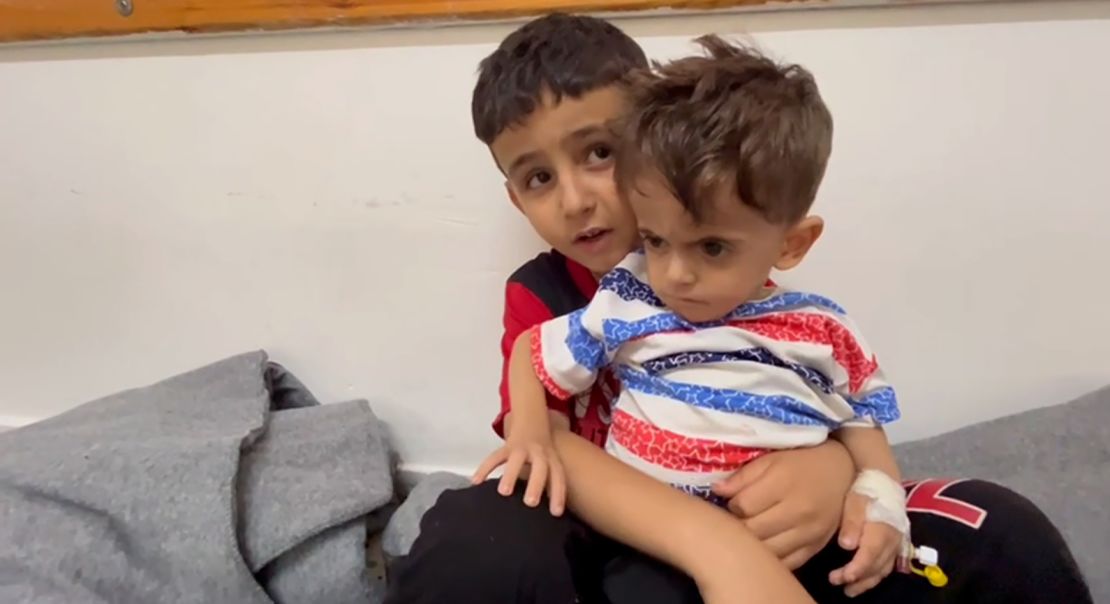Dozens of sick and injured children, including 20 cancer patients, have been evacuated from Gaza through the Kerem Shalom crossing, the first to leave since Israel launched its offensive in Rafah last month.
The 68 were transferred to Cairo, Egypt, on Thursday, Israeli authorities say. COGAT, the Israeli agency responsible for approving aid into Gaza, coordinated the passage along with the Israeli military, the US, Egypt and the World Health Organization (WHO).
The news provided a moment of relief for the parents, whose children who had been unable to access lifesaving care after more than eight months of Israeli bombardment in Gaza.
“It was a tough time for us in northern Gaza, nine months of exhaustion, displacement,” Samira Al-Saeedi, whose six-year-old daughter Jouri was evacuated, told CNN earlier this week. “People started stealing just to eat… Sick children cannot withstand famine.”

CNN footage from Nasser Hospital on Tuesday showed another evacuee – five-year-old blood cancer patient Yasmin – squirming in pain, her emaciated limbs sprawled on a teal mattress.
“She is suffering and moving between hospitals receiving blood treatments… Every day she feels more pain than the day before,” said her mother Umm Ubaida. “She is extremely tired. She can’t wait any longer.”
The evacuations come with the southern Rafah crossing, a key transit point, still closed despite negotiations on its re-opening.
WHO chief Tedros Adhanom Ghebreyesus welcomed the evacuation on Friday. He appealed for increased medical passage “via all possible routes including Rafah and Karem Shalom, to Egypt, the West Bank, East Jerusalem, and from there to other countries when needed.”
But as Israel’s siege persists – and the risk of famine grows – Palestinian officials have warned that the operation was “a drop in the ocean” compared to hundreds more severely ill children who are still trapped in the ravaged enclave.
More than 25,000 sick people require urgent treatment abroad, according to the Ministry of Health in Gaza. Among those are 980 children with cancer – including 250 patients who could face “certain death”?–?the ministry reported on Friday. Israel’s military campaign has depleted the medical system and drained food supplies.
Israel insists there is “no limit” on the amount of aid that can enter Gaza, but human rights agencies warn that its rigid inspection regime on trucks, sustained restrictions on land crossings and relentless bombing campaign means relief is barely dripping in.
Israel launched its military offensive in Gaza after the Hamas-led October 7 attacks on southern Israel, in which at least 1,200 people were killed and more than 250 others were abducted.
Israeli attacks in Gaza have since killed?37,718?Palestinians and injured another?86,377?people, according to Gaza health officials.
‘I was not allowed to leave with them’
Even before the war, chronically ill patients in Gaza faced numerous hurdles when trying to access medical treatment abroad – having lived through years of partial blockade imposed by Israel and Egypt.
Ahead of the planned evacuation on Thursday, parents described days of arduous travel from the northern Kamal Adwan Hospital to the south. Several said their children were malnourished and dehydrated after suffering for months without enough access to food, water or medication – compounding the severity of their symptoms. Other family members claim they were not given approval to accompany their children. Even those allowed to travel did not know when they could leave – telling CNN they had been stuck for days inside a room in Nasser Hospital without windows.

Shadi Mustafa Hussein Yassin, displaced from Nuseirat, central Gaza, is worried for the fate of his 11-year-old Son, Siraj, who was evacuated on Thursday with his mother and two brothers. He told CNN that Siraj, a blood cancer patient, requires a sample from him for a marrow transplant – but he was forced to stay behind.
“I submitted a request to Al-Aqsa Martyrs Hospital to travel with them. They said you cannot travel because you are less than 60 years old.”
CNN has reached out to WHO for comment.


